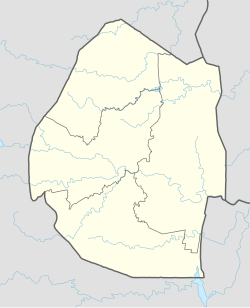Nhlangano
This article needs additional citations for verification. (December 2009) |
Nhlangano | |
|---|---|
 Center of Nhlangano with flowering Jacaranda tree | |
| Coordinates: 27°7′S 31°12′E / 27.117°S 31.200°E | |
| Country | |
| District | Shiselweni |
| Named for | Swazi: nhlangano Meeting place |
| Elevation | 1,050 m (3,440 ft) |
| Population (2005) | |
• Total | 9,016 |
| • Rank | 4 |
| Climate | Cwb |
Nhlangano (Swazi: [n̩ɬáŋanɔ]) in the southwestern corner is the third largest town in Eswatini. It is the capital of the southern Region of Shiselweni and headed by a Regional Administrator Mr. Peter Mamba. The town was established around a migrant Dutch farming community from the neighbouring South Africa province of Transvaal (today Mpumalanga)[1] who gave it the Afrikaans name of Goedgegun. It was an important agricultural town and nexus of maize production, tobacco and cotton farming. Itsd reputation was enhanced by a thriving annual agriculture show - the only one in the country until it was eclipsed by the Manzini Trade Fair. The town was renamed to Nhlangano after independence from Britain in 1968. Nhlangano means "meeting" and commemorates the historic visit Britain's King George VI in March 1947. The British Monarch was accompanied by his wife Queen Elizabeth and their daughter, the Crown Princess Elizabeth who later became Queen Elizabeth ll. They met Swaziland's Paramount Chief, Sobhuza ll. At independence on 6th September 1968 Sobhuza became King and Ingwenyama of Eswatini.
During that visit, King George had reviewed a guard of honour mounted by traditional Swazi regiments and thanked Swazis for providing Britain with sustained military support dating back to 1879 when Swazi forces helped Britain secure control of the then Transvaal and complete Britain's domination of South Africa. The Swazi sent a Pioneer Corps to support Britain in the 1914 First World War as well as during the 1939 Second World Wars.
Now boasting a population of 10,456 (2017 Census)[2] Nhlangano is historically among the most important national heritage sites. It was the first settlement of the modern Eswatini population as it completed its migration from Central West Africa through modern Mozambique. The nucleus of the national leadership migrated north for safety after repeated attacks by stronger communities, especially the Ndwandwe of Zwide and the Zulu, first under Shaka, then Dingane and Mpande. Reflecting on this history, residents of Nhlangano and Shiselweni pride themselves as the stalwarts of the country who successfully defended the country from the frontline. Nhlangano is an important administrative centre. It's well respected boarding high school, Evelyn Baring has produced many national leaders. It also hosts the Ngwane teacher training college and the Nhlangano Farmers' Training Centre. It also hosts the SOS Children's Village.[1]
The town has an important health center, a prison, and a casino hotel.
See also
[edit]Notes
[edit]

